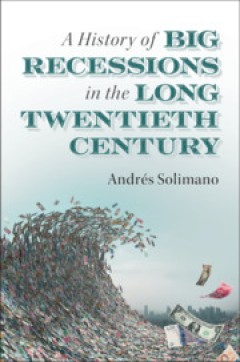Filter by

A History of Big Recessions in the Long Twentieth Century
This book examines the array of financial crises, slumps, depressions and recessions that happened around the globe during the twentieth and early twenty-first centuries. It covers events including World War I, hyperinflation and market crashes in the 1920s, the Great Depression of the 1930s, stagflation of the 1970s, the Latin American debt crises of the 1980s, the post-socialist transitions i…
- Edition
- -
- ISBN/ISSN
- 9781108755276
- Collation
- -
- Series Title
- -
- Call Number
- -

The Wealth of the World and the Poverty of Nations
OCLC-licensed vendor bibliographic record.
- Edition
- -
- ISBN/ISSN
- 9780262270601
- Collation
- 1 online resource (136 pages)
- Series Title
- -
- Call Number
- -

Biological and Social Issues in Biotechnology Sharing
First published in 1998, this was the first book to present a comprehensive summary of both the global as well as institutional issues which are involved in biotechnology sharing. It covers the controversial subject of intellectual property rights (IPR) and the patenting of new discoveries in genetic knowledge in both agriculture and the human genome. One controversial issue is the creation of …
- Edition
- 1
- ISBN/ISSN
- -
- Collation
- p.176
- Series Title
- -
- Call Number
- -

Living Well Now and in the Future: Why Sustainability MattersBy Randall Curre…
Most people acknowledge the profound importance of sustainability, but few can define it. We are ethically bound to live sustainably for the sake of future generations, but what does that mean? In this book Randall Curren, a philosopher, and Ellen Metzger, a scientist, clarify normative aspects of sustainability. Combining their perspectives, they propose that sustainability can be understood a…
- Edition
- -
- ISBN/ISSN
- 9780262339100
- Collation
- 1 online resource (xxiii, 282 pages)
- Series Title
- -
- Call Number
- -

International relations in the cyber age :the co-evolution dilemma
A foundational analysis of the co-evolution of the internet and international relations, examining resultant challenges for individuals, organizations, firms, and states. In our increasingly digital world, data flows define the international landscape as much as the flow of materials and people. How is cyberspace shaping international relations, and how are international relations shaping cyber…
- Edition
- -
- ISBN/ISSN
- 9780262349710
- Collation
- 1 online resource (432 pages)
- Series Title
- -
- Call Number
- -

Fulfilling the pledge :securing industrial democracy for American workers in …
"A review of labor law exploring the decline of union power and demonstrating how collective bargaining can continue to support worker power and improve economic outcomes for workers and communities despite macro shifts in the US economy over the past 40 years"--OCLC-licensed vendor bibliographic record.
- Edition
- -
- ISBN/ISSN
- 9780262377348
- Collation
- 1 online resource
- Series Title
- -
- Call Number
- -

Defending animals :finding hope on the front lines of animal protection
"A journey across the lush, complex, and uneven landscapes of animal protection reveals that the wellbeing of animals is deeply connected to the work and the wellbeing of people"--OCLC-licensed vendor bibliographic record.
- Edition
- -
- ISBN/ISSN
- 9780262375627
- Collation
- 1 online resource
- Series Title
- -
- Call Number
- -

Out of touch :how to survive an intimacy famine
"How modern technology is influencing how humans connect with each other, how it is creating gaps in need-fulfillment, and how genuine connections can be forged in a time where technology paradoxically creates both an abundance of opportunities for connection, but fewer opportunities for real intimacy"--OCLC-licensed vendor bibliographic record.
- Edition
- -
- ISBN/ISSN
- 0262368897
- Collation
- 1 online resource.
- Series Title
- -
- Call Number
- -

Disrupted economic relationships :disasters, sanctions, dissolutions
Empirical studies and theoretical analyses examine the causes and consequences of disruptions in cross-border economic relationships, including political conflict, economic sanctions, and institutional collapse. Cross-border economic relationships gradually strengthened in the decades after World War II; for most of the postwar period, international trade and investment have grown faster than o…
- Edition
- -
- ISBN/ISSN
- 9780262353083
- Collation
- 1 online resource (304 pages).
- Series Title
- -
- Call Number
- -

The power of words in international relations :birth of an anti-whaling disco…
The role of discursive power in shaping international relations analysed through the lens of whaling politics.OCLC-licensed vendor bibliographic record.
- Edition
- -
- ISBN/ISSN
- 9780262272384
- Collation
- 1 online resource (xii, 333 pages) :illustrations.
- Series Title
- -
- Call Number
- -
 Computer Science, Information & General Works
Computer Science, Information & General Works  Philosophy & Psychology
Philosophy & Psychology  Religion
Religion  Social Sciences
Social Sciences  Language
Language  Pure Science
Pure Science  Applied Sciences
Applied Sciences  Art & Recreation
Art & Recreation  Literature
Literature  History & Geography
History & Geography